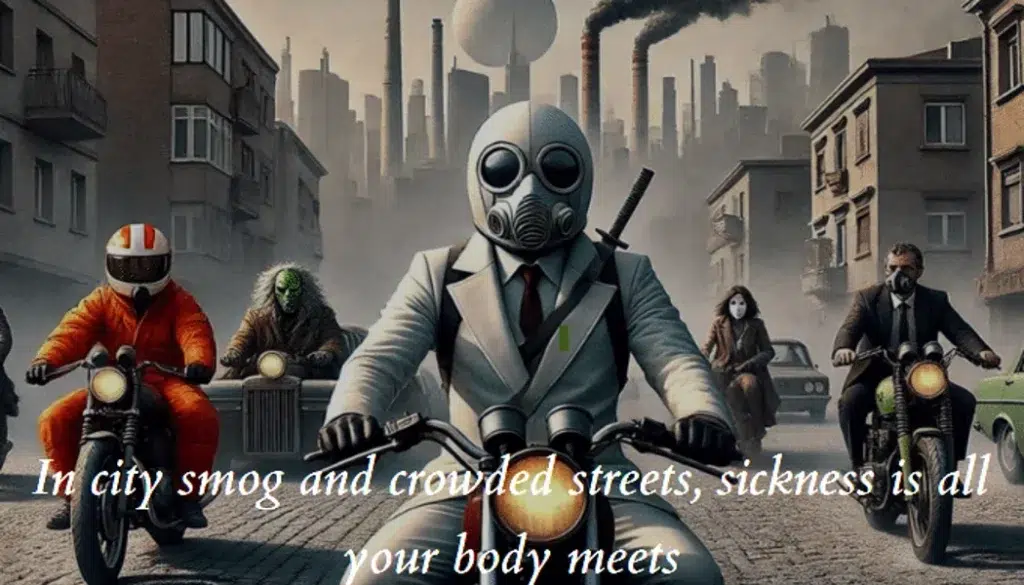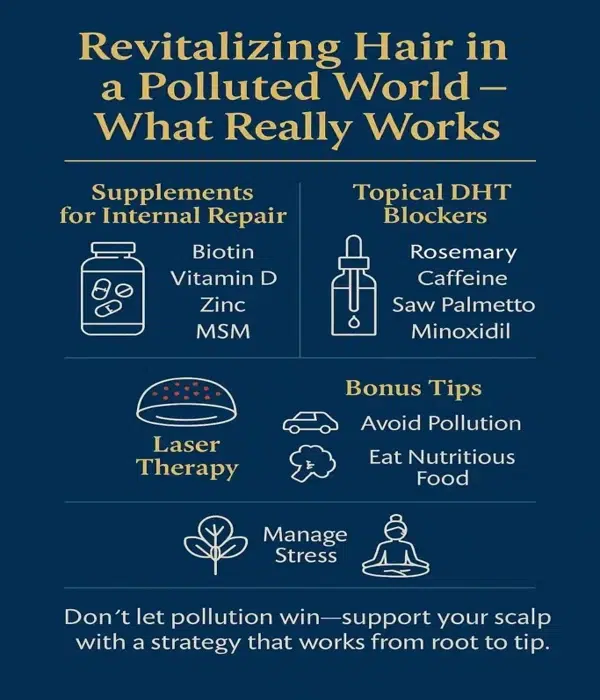Living in a pollution-heavy environment isn’t just bad for your lungs—it’s a silent saboteur of your hair health too. 🌬️ Toxic air doesn’t only get into your body when you breathe it in—it also wages war on your scalp the moment it touches your skin.
Polluted air isn’t picky. It attacks your scalp directly, triggering dryness, inflammation, and even accelerating hair loss. 🧪 The result? Dull, brittle strands that look lifeless no matter how well you style them.
Smoking adds even more fuel to the fire. 🚬 If you’re a smoker, your hair is under constant siege—from both the inside and outside. This double trouble makes protecting your scalp in urban environments a real challenge.

And let’s not forget lifestyle habits. A nutrient-poor diet, too much alcohol, and overloading on sugary sodas during stress all strip your body of the building blocks your hair needs. Even your emotions matter—chronic stress doesn’t just mess with your mind, it disrupts the scalp’s delicate balance. 😖
Where you spend your time also matters. Avoid smoky environments where cigarette clouds linger like unwanted company. ⛔ Make it a habit to seek out fresh air, even in small doses—parks, woods, or just a breezy spot away from traffic. These moments can refresh your body, uplift your mind, and most importantly, support your scalp’s natural resilience.
💡 Bottom line? These scalp-saving habits aren’t optional anymore—they’re necessary armor in today’s polluted world. Your hair will thank you for every clean breath you give it.
🌬️ Breathing Easy: The Effects of Pollution on Hair
Pollution might be an invisible enemy, but its effects on your hair are painfully visible. 💨 Every time you breathe in polluted air, those same toxic particles are landing on your scalp—stripping your hair of shine, strength, and life. It’s like your strands are suffocating under a toxic cloud.
When your hair is exposed to dirty air for long enough, quality takes a nosedive. Your once-vibrant locks can become brittle, dry, and dull. Breakage, inflammation, and hair thinning often follow—a silent but relentless chain reaction. 🔗

And if you’re a smoker, you’re giving pollution a VIP pass to do even more damage. 🚬 Lighting up is like handing your hair over to the enemy with no defense. This double exposure calls for serious protection.
So, what can you do? For starters, be mindful of your air quality—not just outdoors, but indoors too. Consider using air purifiers at home, and when air pollution levels spike, avoid unnecessary exposure. According to a study published on PubMed Central, airborne pollutants such as particulate matter (PM) can penetrate the scalp and hair follicles, triggering oxidative stress and inflammation that may lead to premature hair loss.
Beyond that, small daily habits can make a big difference. Adjust your diet by reducing sugar, managing stress, and drinking in moderation. 🥦💧 These steps won’t just protect your scalp—they’ll boost your overall vitality. Think of it as a total wellness upgrade, starting from the roots.
🌲 A Breath of Fresh Air: Strategies to Combat Polluted Environment Effects
Escaping the chaos of city life—even for a short while—can do wonders for your hair. 🌬️ Time spent in nature gives your scalp a much-needed break from the assault of pollution, recharging your mental energy and letting your hair recover in peace.
Even a simple weekend trip to the countryside acts like a detox for your body and your hair. 🏞️ The clean air, the lack of industrial fumes—it all adds up. Fresh air becomes a tonic for your tired strands, helping to restore their natural shine and bounce.

It’s not just a luxury—it’s a strategy. Making time to step into open, green spaces should be part of your hair care plan. 🧘♂️ These escapes from urban smog help reduce your exposure to environmental toxins and oxidative stress.
And don’t overlook cigarette smoke. 🚫 Hanging around smoky environments floods your scalp with secondary pollutants, undoing the benefits of your efforts. Avoiding these hotspots is a smart move if you’re serious about protecting your hair.
Even in a city, seek out micro-oases of clean air: urban parks, riversides, rooftop gardens. 🌳 These spots might be small, but the benefits stack up. Your hair (and your lungs) will thank you for every breath of cleaner air you give them.
🧪 Revitalizing Strategies for Enhancing Hair Health
Good news—hair hope is on the horizon! 🌟 There are several powerful ways to restore and strengthen strands damaged by pollution. Whether you’re into science, nature, or a mix of both, there’s a solution for every scalp.
Supplements packed with essential nutrients like biotin, vitamin D, and zinc help repair the damage from the inside out. 🌿 These tiny powerhouses fuel the root system, making it easier for hair to grow strong, shiny, and resilient.
💡 To make things easy, here’s a quick breakdown of all the best tools you can use to fight back against pollution and revitalize your hair:

Topical DHT-blocking conditioners are another effective tool. With ingredients like caffeine, rosemary, or clinically backed minoxidil, these products defend your follicles and promote a fuller appearance.
And if you’re ready to level up, low-level laser therapy (LLLT) is one of the most promising options today. 🚨 Safe, non-invasive, and surprisingly futuristic, it can help you regrow hair where pollution took its toll.
With a bit of hope and humor, your journey from brittle to brilliant can begin. Step by step, you’ll reclaim your hair—and maybe even have some fun doing it.
Want to know who’s behind the science? ✍️ Read more about the author.

✅ FAQ – Air Pollution and Scalp Health: Research-Based Insights
❓ How does air pollution physically affect the scalp and hair?
Pollutants like PM2.5, heavy metals, and ozone can penetrate the scalp, causing oxidative stress and inflammation. This weakens hair follicles, disrupts the growth cycle, and contributes to dryness, itching, and increased hair shedding over time.
❓ Can pollution particles clog hair follicles like sebum or product buildup?
Yes. Fine particulate matter can mix with sweat, oil, and dead skin cells to form a residue that clogs follicles. This can reduce oxygen and nutrient flow to the roots, which may impair hair growth and lead to follicle miniaturization if left unaddressed.
❓ Do antioxidant-rich shampoos help protect against pollution damage?
They can. Ingredients like green tea, vitamin E, niacinamide, and charcoal help neutralize free radicals and reduce inflammation. While they won’t block pollution entirely, they act as a shield and cleanup crew for your scalp.
❓ Should I wash my hair more often if I live in a polluted city?
Not necessarily more often, but more strategically. Gentle cleansing every 2–3 days with a scalp-focused shampoo can help remove pollutants without over-stripping. Over-washing can damage the skin barrier, making it more vulnerable to pollutants.
Last updated: June 2025 based on latest research


Leave a Reply